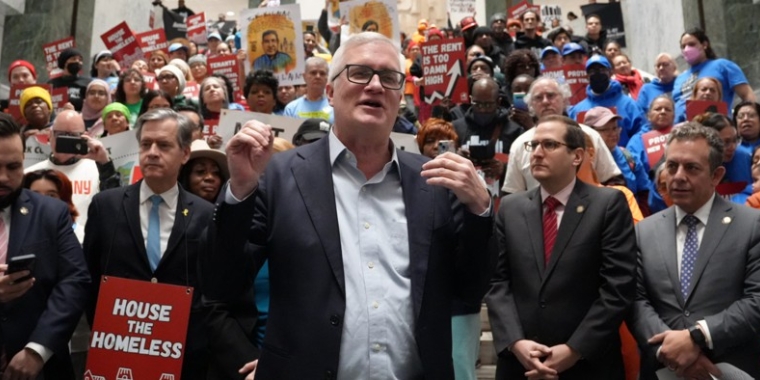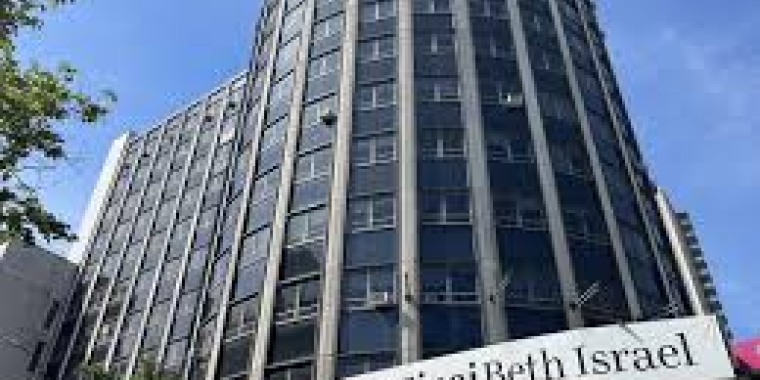Governor Hochul Announces Enactment of Law Significantly Increasing Protections for Loft Residents
December 7, 2021
-
ISSUE:
- loft law
Governor Kathy Hochul today announced the recent enactment of legislation (S.6950/A.7667) that makes it unlawful to disrupt or fail to provide essential services and habitability for interim multiple dwelling units and allows tenants to pursue a claim in New York City Housing Court. This bill makes in unlawful for any loft owner to interrupt, deny, or discontinue essential services or create an uninhabitable environment in a multiple dwelling unit or for any tenants covered by the existing "Loft Law." Examples of essential services include heat, hot water, electricity, and gas. Examples of an uninhabitable environment can include one where there are leaks, there is mold, or a lack of building maintenance that creates dangerous conditions. This law became effective Dec. 1, 2021.
"It's not a luxury to live in a home with essential services like heat and hot water — it's a basic human right that every New Yorker deserves," Governor Hochul said. "This common-sense legislation gives tenants access to redress in housing court when they are denied essential services, a crucial step towards keeping New Yorkers safe in their homes."
Lieutenant Governor Brian Benjamin said, "Nobody should be worried about not having the essential services they need in their home as a result of a mundane, outdated legal loophole. Loft and multiple dwelling unit tenants deserve the same basic rights afforded to every other New York resident. I want to thank the bill sponsors and Governor Hochul for signing this important legislation."
Enacted in 1982, the Multiple Dwelling Law established the Loft Law and created a new class of buildings in New York City known as interim multiple dwellings or "lofts". Lofts are former commercial and manufacturing loft spaces that are being used as residences. The Loft Law also established the Loft Board to coordinate the legal conversion of these spaces to safe residential units.
Over the past several years, residents of legally-designated "lofts" have been experiencing an increase in harassment and neglect and have not been able to consistently have their grievances addressed in NYC Housing Court, where nearly all other tenants are able to seek redress. Examples of harassment and neglect include failure to provide basic and essential services, such as heat, hot water, electricity, and gas, as well as failure to maintain safe and appropriate living conditions: failing to fix leaks, remediate mold, and other similar issues. As a result of being unable to have their grievances addressed in housing court, loft tenants have been unable to avail themselves of the increasingly expanded protections New York State and City have broadly enacted for tenants over the last decade, including universal access to free representation in New York City housing court.
Recent court decisions have made it clear that loft tenants could not fully pursue their rights under the more expansive protections provided by New York's housing laws in housing court, but had to appear before the Loft Board, which had not been fully equipped to address issues of landlord harassment and neglect. This legislation fixes this basic problem and expands the protections for tenants living in lofts from landlord harassment and clarifies that they may pursue certain complaints in housing court.
The new law now prohibits a landlord of a loft from cutting essential services to the building once the tenant has filed an application with the Loft Board to normalize the apartment, and the Loft Board has assigned a docket number to the case. Additionally, the legislation prevents landlords from evicting tenants of lofts while a case is pending before the Loft Board and permits the tenant to file a complaint in housing court in addition to the Loft Board. Finally, the legislation allows the tenants to file complaints in housing court and requires the continuation of essential services. Being provided an appropriate living space with necessary amenities should be a universal right, and is in no way unique to loft tenants.
Senator Julia Salazar said, "When the Loft Law was renewed and enhanced in 2019 the intent was to provide protections and a fair process for loft tenants. Issues relating to repairs and habitability ought to be heard in Housing Court, not by the Loft Board, which is not equipped to resolve such questions. I am thankful to Governor Kathy Hochul for signing this legislation which would amend the Loft Law and grant loft tenants the same protections to safe and habitable housing as other tenants."
Assemblymember Deborah J. Glick said, "It was disappointing to have the courts misread the loft statute. This bill will ensure that all tenants, including loft tenants, have access to housing court in relation to a lack of essential services. This measure clarifies that housing court, not the loft board, is the appropriate venue when loft tenants are seeking redress for housing services issues. Clarifying this access is even more critical as the City Administration's zoning changes erode previous protections. While the City has referred to state housing regulations, this measure will ensure legal recourse for loft tenants."
Senator Brian Kavanagh, Chair of the Senate Housing Committee, said, "In recent years, through the enactment of the broad provisions of the Housing Stability and Tenant Protection Act and specific legislation to strengthen the Loft Law, my colleagues in the legislature and I have made it clear that we will do what is necessary to ensure that every New Yorker has access to stable, safe, and affordable housing. Of course that effort includes providing for an effective response when certain unscrupulous property owners take steps that make their tenants' homes unlivable. I commend and thank Senator Julia Salazar and Assemblymember Deborah Glick, who have been especially forceful champions of the cause of protecting loft tenants, and Governor Kathy Hochul, who in her short time as our chief executive has already made big strides in protecting New Yorker's homes."
Assemblymember Steven Cymbrowitz said, "All tenants are entitled to equal access to a habitable living space and essential protections, as well as the right to seek legal redress when these rights are denied. This new law will mean that loft tenants will finally have the same legal protections as other tenants and will have the option of seeking justice in Housing Court should it become necessary to do so."
Executive Director of New York State Tenants & Neighbors Genesis Aquino said, "The passage of this bill means more than closing a loophole to allow loft tenants to enforce their right to habitable conditions, it's a step closer to eliminating substandard housing in New York State. As an organization that fights for tenants' rights to safe homes, NYS Tenants & Neighbors understand the impact that unsafe housing conditions can have on people's health, and we commend Governor Hochul for signing the Loft Law Bill and recognizing that all tenants deserve to live decent homes. We also thank Assembly Member Glick and Senator Salazar for cosponsoring the bill for this needed legislation."
Director of Civic Engagement & Research from Churches United for Fair Housing, Whitney Hu, said, "This is a great win for tenant's rights especially because loft tenants have been especially vulnerable to being denied essential services by their landlords. We're glad to see Governor Hochul & her administration move forward in ensuring that all New Yorkers have dignified living spaces and protections. We're also thankful for the continued advocacy and work of Senator Julia Salazar and Assembly Member Deborah Glick for this necessary legislation."
Campaign Coordinator, Housing Justice for All, Cea Weaver said, "All tenants in New York must have the right to defend themselves from evictions and unsafe living conditions in Housing Court, and I thank Senator Salazar, Assembly Member Glick, and Governor Hochul for ensuring that loft tenants have the same rights and protections as all others. Loft apartments have provided a critical source of affordable housing to New York for decades -- today's legislation recognizes this fact and affirms these critical rights for thousands of tenants in our neighborhoods and communities."



